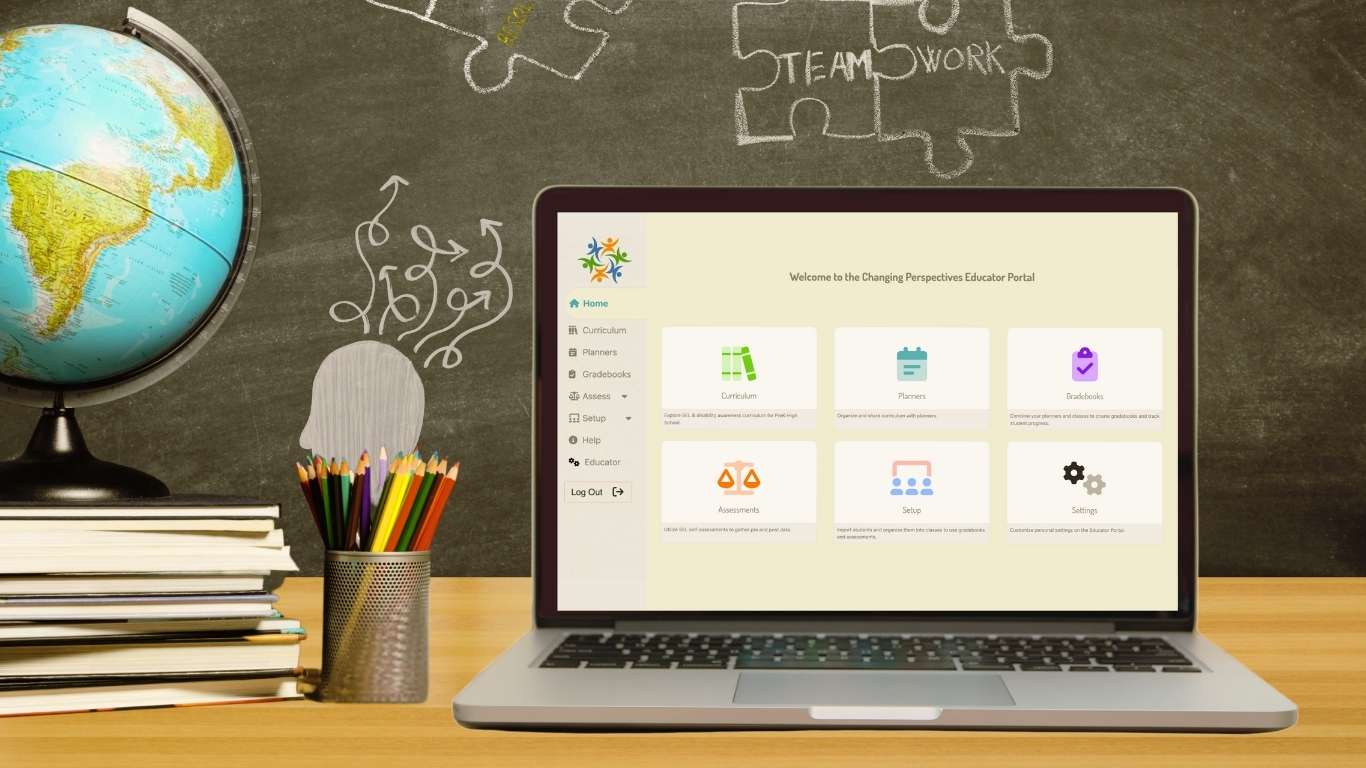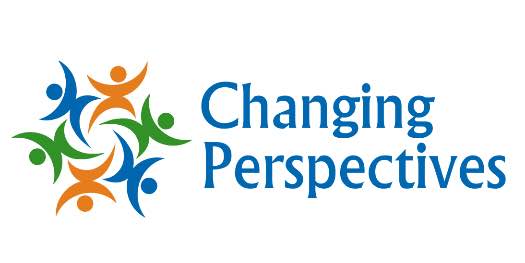 At Changing Perspectives, we believe that every instructional moment is an opportunity to model empathy, build connections, and foster a sense of belonging.
At Changing Perspectives, we believe that every instructional moment is an opportunity to model empathy, build connections, and foster a sense of belonging.
When thoughtfully designed, curriculum becomes one of the most powerful levers for schoolwide transformation—shaping not just what students learn, but how they see themselves and each other.
Too often, educators must stitch together disjointed materials: lessons that lack relevance, fail to reflect student identities, or leave little room for teacher voice.
That’s where Changing Perspectives comes in.
Meet Our Two Core Curricula
Changing Perspectives offers two student-centered curricula through our Educator Portal: Social-Emotional Learning and Disability Awareness. Each one is designed to help students better understand themselves and others while building the skills for students to become inclusive and empathetic individuals.
Social-Emotional Learning Curriculum
Our Social-Emotional Learning (SEL) Curriculum helps students develop emotional intelligence and interpersonal skills that support both academic success and lifelong well-being.
- Promotes emotional intelligence and interpersonal skills like empathy and responsible decision-making
- Aligned with the CASEL framework and ASCA Mindsets & Behaviors Standards
- Used for morning meetings, advisory periods, behavior support, and schoolwide implementation
Disability Awareness Curriculum
Our Disability Awareness (DA) Curriculum equips students to understand disability as a natural part of human diversity, fostering empathy and inclusive behaviors that extend beyond the classroom.
- Promotes empathy through real-world disability representation and identity affirmation
- Aligned with IDEA and Common Core State Standards
- Used in classroom instruction, advisory periods, inclusion events, awareness weeks, and schoolwide campaigns
Both curricula are flexible, easy to implement, and aligned with nationally recognized frameworks, supporting meaningful and sustainable change at any stage of your journey.
Why Educators Choose Our Curriculum
Our lesson plans and curriculum resources are written by educators, for educators. At Changing Perspectives, we understand the realities of today’s classrooms, and we design content that fits seamlessly into daily instruction.
Even better? Our curriculum is available through an annual subscription with no long-term contracts required. Schools and educators can access high-quality, flexible resources without being locked into expensive, multi-year commitments.
What makes our curriculum stand out?
- Use-What-You-Need Flexibility: Lessons can be used independently or integrated into a broader scope and sequence. There are no rigid pacing guides or one-size-fits-all expectations; instead, there are tools designed to fit your unique teaching context.
- Mindset Shifts, Not Just Content: The materials prompt reflection, encourage empathy, and expand student perspectives, not just deliver facts.
- Driven by Educator Feedback: The educators who use our resources continuously refine them. Real classroom experiences fuel every improvement.
Benefits of Our Curriculum
A well-rounded education extends beyond academics and cultivates empathy, strengthens resilience, and fosters a sense of community. Our SEL and DA curricula are standards-aligned and designed to deliver lasting, measurable results. Here is what the research shows:
Social-Emotional Learning (SEL)
- 11% academic improvement: Students participating in SEL programs demonstrate, on average, an 11% increase in academic performance.
- 27% boost in positive social behaviors: SEL leads to stronger interpersonal skills and fewer conduct issues or emotional challenges.
- Better long-term outcomes: Students with strong SEL skills are more likely to succeed in school, college, careers, and relationships.
Disability Awareness
- More inclusive attitudes: Students develop greater acceptance and understanding of peers with disabilities.
- Higher empathy, lower bullying: Increased empathy is associated with a decrease in incidents of bullying and social exclusion.
- Greater Sense of Belonging: Students with and without intellectual disabilities report feeling more included and connected in schools.
Explore our 2024–2025 Curricula Impact Report to discover how schools are utilizing our curriculum to foster more inclusive, empathetic, and equitable learning environments.
Schedule a Free 15-Minute Demo
How It Works in Practice
Resources are only helpful if educators can actually use them. That’s why every Changing Perspectives lesson is available to teachers online through the Changing Perspectives Educator Portal. Our dynamic platform enables users to easily navigate through thousands of resources and select the ones that best meet the needs of their students.
Instructional Resources
- Lesson Plans: Includes discussion prompts, extension activities, and assessments.
- Curated Book Lists: Paired with guided questions to deepen comprehension.
- Video-Based Resources: With built-in reflection tools to support active learning.
- Daily SEL Check-Ins: Foster quick, meaningful connections with students.
- Family Resources: Extend learning beyond the classroom.
Portal Features
Fully integrated into an interactive platform that includes:
- Digital Planners: Build a customizable scope and sequence and share lessons with ease.
- Connected Gradebooks: Track progress through formative assessments.
- Collaboration Tools: Co-plan and share content with colleagues or families, even if they don’t have a subscription.
- Assessments: Administer pre- and post-competency assessments in both digital and paper formats to evaluate student growth and measure the impact of SEL programs and interventions.
Whether you’re a classroom teacher, school counselor, special educator, or family liaison, our portal works the way you do, so it streamlines your workflow instead of complicating it.
Schedule a Free 15-Minute Demo
Full Curricula Deep Dive
Social-Emotional Learning Curriculum
Social and emotional learning isn’t extra, it’s essential. Research indicates that students with strong social-emotional skills tend to perform better academically, exhibit more positive social behaviors, and experience less emotional distress. These outcomes don’t just support individual success; they help create stronger, safer, and healthier school communities.
With SEL, students learn to manage their emotions and behaviors, show care and concern for others, solve problems effectively, make responsible decisions, and maintain healthy relationships. They learn to pause, reflect, and respond to situations with intention rather than impulse. Students develop empathy by learning to recognize and respect different perspectives, skills that are just as important in the classroom as they are in life.
The Changing Perspectives SEL Curriculum goes beyond surface-level check-ins or isolated lessons. It helps educators weave social-emotional skill-building into the fabric of everyday instruction while respecting their time, professional judgment, and the realities of the classroom. Aligned with the CASEL framework and the American School Counselor Association (ASCA) Mindsets & Behaviors Standards, our curriculum ensures that educators are supported by nationally recognized best practices in the implementation of social-emotional learning.
Disability Awareness Curriculum
Disability is diversity. People with disabilities represent over 15% of the world’s population, making them the world’s largest minority. Yet disability remains one of the most overlooked aspects of diversity, equity, and inclusion.
Disability does not exist in a vacuum. Each person experiences the world through their own unique identity, which Changing Perspectives calls their “identity puzzle.” The pieces of one’s identity puzzle might include aspects such as race, culture, religion, language, gender identity, socioeconomic status, or family structure. Disability intersects with all of them. A student may be both neurodivergent and multilingual. A student with a chronic illness may also be facing racism, poverty, or trauma. When disability is taught in isolation, we risk reinforcing the very marginalization we aim to dismantle.
We believe that students can’t include what they haven’t been taught to understand. Our Disability Awareness Curriculum provides all students with the opportunity and language to initiate these conversations at an early stage. For students with disabilities, it affirms their identity and helps them celebrate who they are. For students without disabilities, it builds awareness of how others experience the world, cultivating empathy and reducing stigma.
Aligned with the Common Core State Standards and organized within eight disability categories to mirror IDEA (Individuals with Disabilities Education Act), our curriculum helps bridge academic instruction and inclusive values, making authentic inclusion possible and sustainable.
Schedule a Free 15-Minute Demo
Connecting Curriculum to the Full Model
The Changing Perspectives curriculum isn’t a standalone resource; it serves as the student-facing anchor of our holistic support model.
It works hand in hand with our four additional services:
- Family Engagement: Reinforces curriculum themes at home and across the broader community.
- Professional Development: Establishes common instructional language and provides opportunity for professional growth.
- School Site Visits: Support implementation through on-site observation and targeted support.
- Virtual Coaching: Helps educators adapt and implement content based on real student needs.
Together, these services form a cohesive ecosystem, fostering an environment where students not only succeed academically but also develop into empathetic, confident, and well-rounded individuals.
Ready to Change What Curriculum Can Be?
If you’re ready to move toward something transformational, we invite you to explore what Changing Perspectives has to offer:
Disability Awareness Curriculum
Social-Emotional Learning Curriculum
Schedule a Free 15-Minute Demo
Curriculum is more than content. It’s the first step toward reshaping school culture. Let’s build classrooms where every student feels seen, valued, and empowered to learn.
